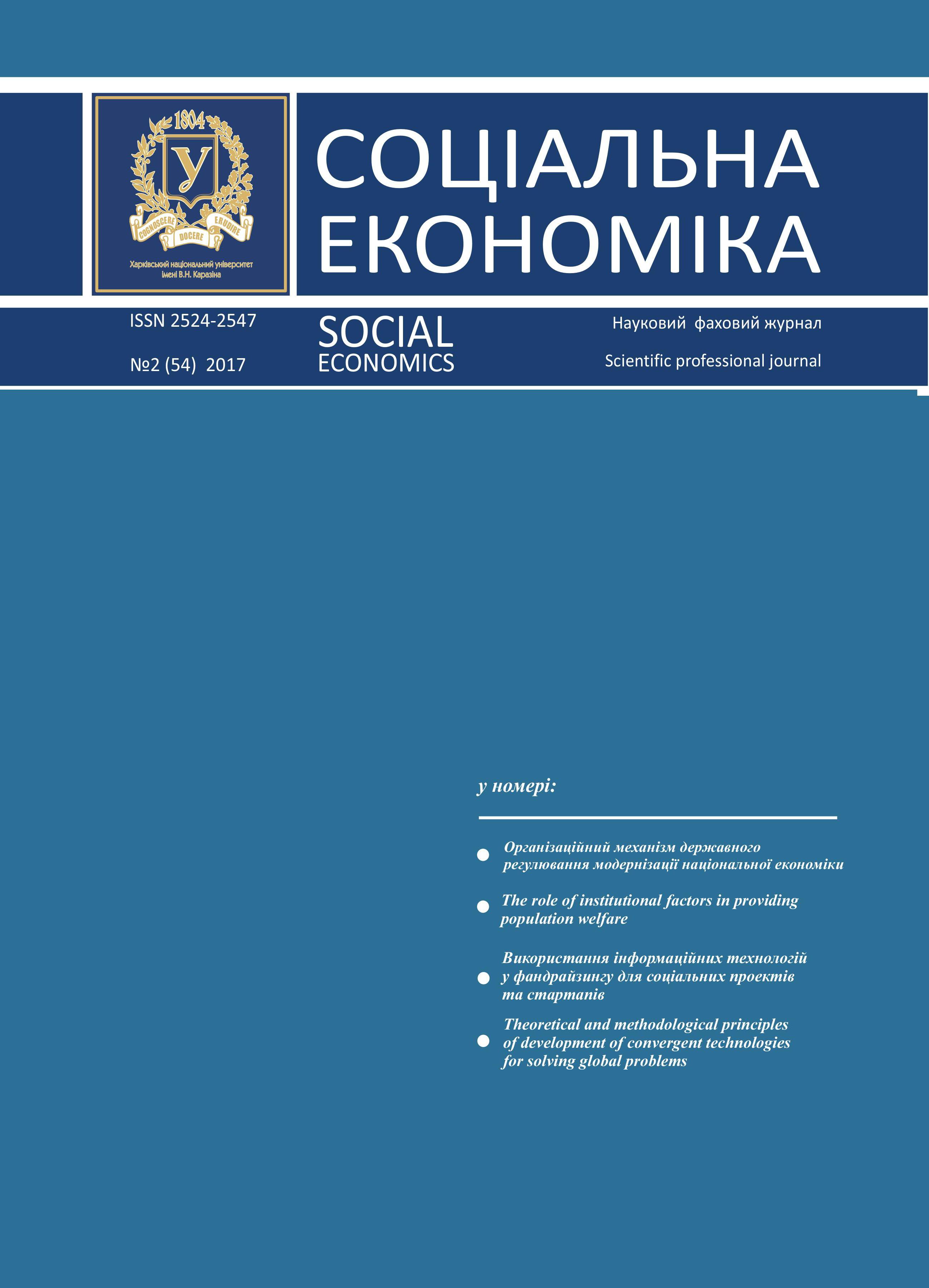РОЛЬ ІНСТИТУЦІЙНИХ ЧИННИКІВ У ЗАБЕЗПЕЧЕННІ ДОБРОБУТУ НАСЕЛЕННЯ
Анотація
Мета статті полягає у дослідженні впливу інститутів та інституційних чинників на рівень забезпечення добробуту населення. Аналізуючи, систематизуючи й узагальнюючи наукові праці багатьох дослідників, виявлено, що економічний успіх тієї чи іншої країни залежить від інститутів – правил, за якими працює її економіка, і стимулів, які отримують її громадяни. У результаті дослідження розкрито сутність понять інклюзивних та екстрактивних інститутів. Виокремлено сучасні інституційні підходи до вивчення категорії «добробут». Розкрито особливості формування інституційного середовища в Україні та його роль у забезпеченні добробуту населення. Виявлено, що інституційна слабкість щодо забезпечення добробуту населення вища у країнах з повільними реформами, ніж в країнах-лідерах трансформації, що обумовлено низькою ефективністю запровадження політики інституцій, задоволенням потреб олігархічної верхівки, корупцією на місцевому та національному рівнях. Розкрито сутність поняття «інституційна пастка» та виявлено передумови її виникнення. Проведено порівняльний аналіз стану інституційного середовища України з іншими країнами світу, використовуючи індикатори Всесвітнього економічного форуму та провідних аналітичних центрів (індекс інклюзивного розвитку, індекс сприйняття корупції, міжнародний індекс щастя, коефіцієнт Джині, коефіцієнт Пальма тощо). Перспективою подальших досліджень у даному напрямку є розробка механізму управління інституційними чинниками з метою підвищення рівня добробуту населення України.
Завантаження
Посилання
2. Economic Theories of the School of Lausanne (L. Walras, V. Pareto). Retrieved from : ecouniver.com/economik-rasdel/istekuz/134-yekonomicheskie-teorii-lozannskoj-shkoly-l -valas.html (in Rus).
3. Welfare state (2012). Retrieved from : global.britannica.com/topic/welfare-state (in Rus).
4. Karl M. The foundations of political economy on the causes of progressive welfare of people. Retrieved from : polbu.ru/menger_politeconomy/ch05_all.html (in Rus).
5. The theory of sustainable economic growth by John von Neumann. Retrieved from : newinspire.ru/lektsii-po-ekonomicheskomurorostu/teoriya-ustoychivogo-ekonomicheskogo-rosta-dzhona-fon-neymana-2671 (in Rus).
6. Ronald H. Coase (1991). The Institutional Structure of Production. Retrieved from : www.nobelprize.org/nobel_prizes/economic sciences/laureates/1991/coase-lecture.html.
7. Oliver I. Williamson (1996). Economic Institutes of Capitalism. Retrieved from : dahluniversitymanagementinstitute.files.wordpress.com/2016/10/w.1996.pdf.
8. North D. C. (1990). Institutions, institutional change and economic performance. Cambridge. Retrieved from : www.cambridge.org/ua/academic/subjects/politics-international-relations/political-economy/institutions-institutional-change-and-economic-performance?format=PB&isbn=9780521397346.
9. Acemoglu Daron. (2014). Ukraine’s Legacy of Serial Oligopoly The Globe and Mail. Retrieved from : www.theglobeandmail.com/opinion/ukrainians-need-inclusion-not-extraction/article17481308/.
10. Acemoglu D. (2014). Extractive Institutions in Action: Uzbekistan. Retrieved from : whynationsfail.com/blog/2012/2/24/extractive-institutions-in-action-uzbekistan.html.
11. J. Robinson, D. Asemoglu (2012). Why nations fail? The Origin of Power, Prosperity and Poverty. Retrieved from : loveread.ec/read_book.php?id=66365&p=1 (in Rus).
12. Acemoglu D. (2014). Why is central planning? Retrieved from : whynationsfail.com/blog/2012/8/20/why-central-planning.htm.
13. The World Economic Forum has compiled a fairness index (2017). Retrieved from : www.vedomosti.ru/economics/articles/2017/01/16/673218-rossiya (in Rus).
14. Inclusive Development Index 2017 (2017). Retrieved from : widgets.weforum.org/inclusive-development-index-2017/.
15. The Inclusive Growth and Development Report 2017 (2017). Retrieved from : www.weforum.org/reports/the-inclusive-growth-and-development-report-2017.
16. Kholod N.M. (2009). Distribution of Income and Poverty in Transition Economies, Lviv, 442. (in Ukr).
17. Klimenko O. M. (2015). Characteristics of the welfare of the population at the present stage of development of society BusinessInform, 4, 17-21 (in Ukr).
18. Polterovich V.М. (2004). Institutional Traps: Is There an Output? Social sciences and modernity, 3, 5-11 (in Rus).
19. Transparency International. (2016) Corruption Perceptions Index 2016. Retrieved from : www.transparency.org/news/feature/corruption_perceptions_index_2016.
20. Donald C. The History of Privatization. Retrieved from : talkingpointsmemo.com/features/privatization/one/.
21. Schneider F. (2015). Size and Development of the Shadow Economy of 31 European and 5 other OECD Countries from 2003 to 2015 : Different Developments. Retrieved from : www.econ.jku.at/members /Schneider/files/publications/2015/ShadEcEurope31.pdf.
22. Schneider F. (2016). The size and development of the shadow economies of Ukraine and the six other eastern countries over the period of 1999 to 2015. Retrieved from : www.ed.ksue.edu.ua/r/knt/ee162_78/e162sch.pdf.
23. Schneider F. (2017). The Shadow Economy and Shadow Economy. Labor Force: What Do We (Not) Know? Retrieved from : ftp.iza.org/dp5769.pdf.
24. The Guardian. (2017). Inequality index: where are the most unequal countries in the world? Retrieved from : www.theguardian.com/inequality/datablog/2017/apr/26/inequality-index-where-are-the-worlds-most-unequal-countries?CMP=share_btn_fb.
25. The World Hapiness Report 2017 (2017). Retrieved from : worldhappiness.report/ed/2017/.
26. The mood of Ukrainians by the end of 2016 (2016). Ukrainian Institute of the Future. Retrieved from : uifuture.org/uk/post/nastroi-ukrainciv-na-kinec-2016-roku_92.
27. Libanova E.M. (2014). Infringement in the Ukrainian society: sources and modernity. Economy of Ukraine, 3 (620) (in Rus).
28. Socio-economic situation of households in Ukraine (2016). State Statistics Service. Retrieved from : www.ukrstat.gov.ua/druk/publicat/kat_u/publdomogosp_u.htm (in Ukr).





